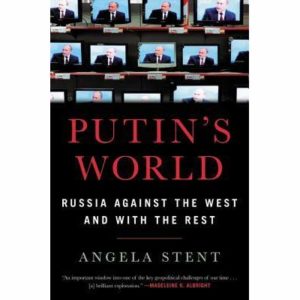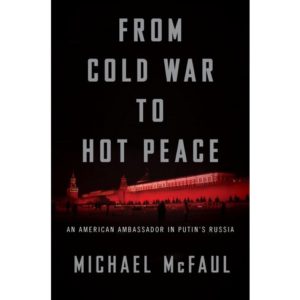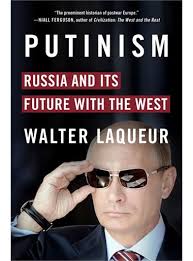 Russia’s “appeal as an opponent of regime change and supporter of existing governments endears it to all governments in the area, authoritarian and democratic,” Georgetown University’s Angela Stent writes in her new book, “Putin’s World.”
Russia’s “appeal as an opponent of regime change and supporter of existing governments endears it to all governments in the area, authoritarian and democratic,” Georgetown University’s Angela Stent writes in her new book, “Putin’s World.”
She recounts the leverage Moscow derives from its exceptional tool kit: a U.N. Security Council veto, a massive doomsday arsenal, heavy investment in its military, global weapons sales, vast hydrocarbon reserves, and tactical daring (hacking, disinformation, assassinations). She further underscores the country’s web of long-standing relationships, inherited from the ideological Soviet Union, but unlike the latter, Russia’s global engagement is coldly pragmatic, Princeton’s Stephen Kotkin writes for The Washington Post:
What does not come through is the larger strategic failure of U.S.-Russia policy under Obama. The president was suitably wary of American over-extension, hyper-militarization and leading with democracy promotion, but he stocked his administration with regime change zealots, whom he did not empower to do what they were clamoring to do, but whom the Kremlin and others could point to and say, aha, they are the real U.S. policy. RTWT
 Michael McFaul, Obama’s ambassador to Moscow, would no doubt take issue with Kotkin’s characterization. Subject to a Kremlin campaign of vilification and harassment from his first day on the job, he believes Putin is now aiming to export his model further afield (contrary to critics who suggest otherwise).
Michael McFaul, Obama’s ambassador to Moscow, would no doubt take issue with Kotkin’s characterization. Subject to a Kremlin campaign of vilification and harassment from his first day on the job, he believes Putin is now aiming to export his model further afield (contrary to critics who suggest otherwise).
“While developing his set of autocratic, illiberal, and conservative ideas for ruling Russia and disrupting the international liberal order, Putin also created a suite of instruments both to propagate his ideology and system of government abroad, and to weaken his ideological adversaries around the world, particularly those in the West who support liberal, democratic norms,” he told this week’s House Intelligence Committee hearing on “Putin’s Playbook: The Kremlin’s Use of Oligarchs, Money and Intelligence in 2016 and Beyond”:
 Putin pursues these dual ideological objectives – promoting his conservative, nativist, autocratic ideas and attacking liberal democracy – at the same time. Today, Putin and his entourage proudly claim that “Putinism” has appeal beyond Russia’s borders. As Putin aide Vladislav Surkov wrote earlier this year, it is “an ideology of the future” … a “political system created in Russia [which] is suitable not only for the national future, but it has a significant export potential; there is already demand on it and on some of its components; its experience is already being examined and adopted; both people in power and opposition groups in many countries imitate it.”
Putin pursues these dual ideological objectives – promoting his conservative, nativist, autocratic ideas and attacking liberal democracy – at the same time. Today, Putin and his entourage proudly claim that “Putinism” has appeal beyond Russia’s borders. As Putin aide Vladislav Surkov wrote earlier this year, it is “an ideology of the future” … a “political system created in Russia [which] is suitable not only for the national future, but it has a significant export potential; there is already demand on it and on some of its components; its experience is already being examined and adopted; both people in power and opposition groups in many countries imitate it.”
To export these ideas, Putin has deployed several strategies, adds McFaul,* author of From Cold War to Hot Peace :
 First, Putin and his government invested heavily in international media. Putin
First, Putin and his government invested heavily in international media. Putin
quickly understood the importance of controlling the media to maintain his rule at home
and has subsequently expanded this instrument of influence abroad…..- Second, Putin and his proxies set up organizations, fake identities, and bots to
influence public opinion on non-Russian social media platforms around the world, but
especially in the West…. - Third, Putin has deployed his intelligence agencies to steal information from foes
and then publish this information in ways to weaken his enemies, be they individuals or
nation-states. These techniques have been deployed actively in Ukraine. .. - Fourth, the Kremlin actively cultivates direct contacts and ongoing relationships
with NGOs, political parties, religious groups, and individual politicians sympathetic to
“Putinism”…. - Fifth, in parallel with Putin’s use of money, corruption, and property rights as
instruments for governing inside Russia, the Russian government instructs its economic
actors to make deals with foreign entities to establish increased leverage and influence
within these countries… - Sixth and most rarely, Putin has mobilized soldiers – regular conscripts as well as
“volunteers” – to export “Putinism” by force. Russia’s annexation of Crimea in 2014 and
military support for separatists in the Donbass are the most dramatic use of this instrument
of ideological transnationalism……RTWT
*A former Reagan-Fascell fellow at the National Endowment for Democracy.
In a new episode of Brookings‘ Intersections podcast, @AngelaStent and @KeirGiles discuss how Russia’s identity & history drive its confrontational approach to the West.







